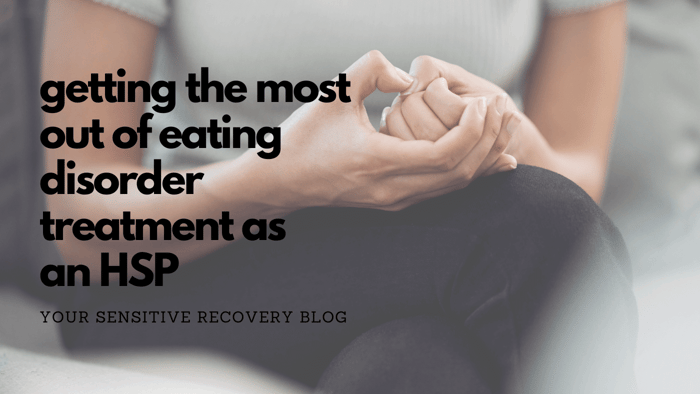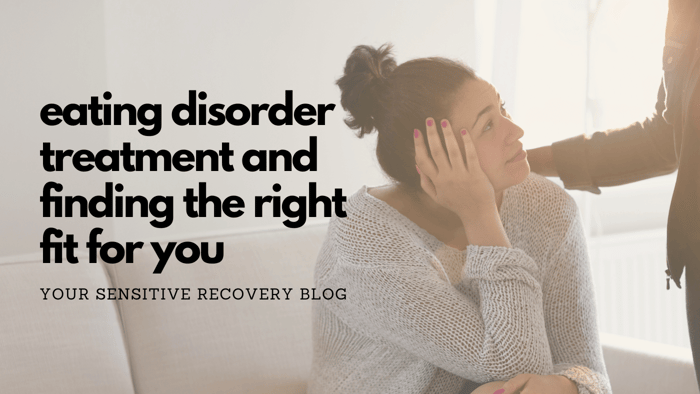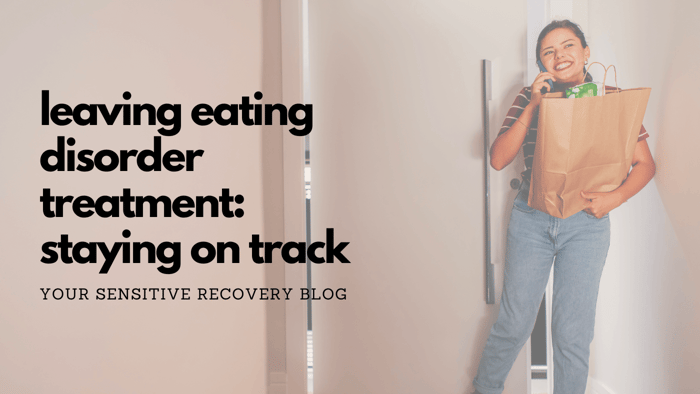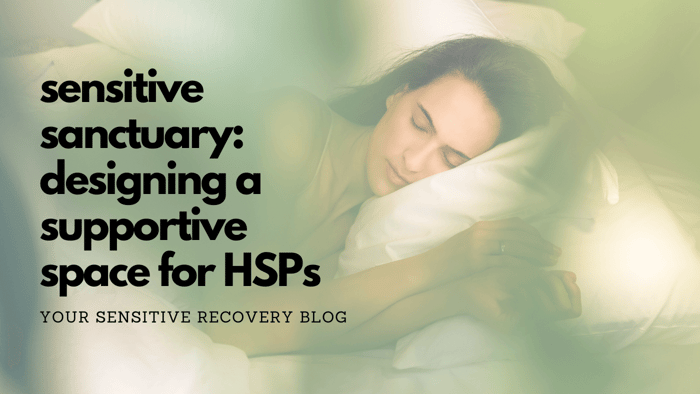Eating disorder treatment is challenging for anyone, but for those who identify as Highly Sensitive, the experience can come with its own unique set of complications and considerations.
Drawing from my experience as a highly sensitive human in treatment settings and later as a recovered clinician working across multiple levels of care, I'll share valuable insights I've gained on how to optimize your eating disorder treatment experience and enhance your recovery process.
First Things First: Understanding Your Sensitivity
A Highly Sensitive Person (HSP) is exactly what it sounds like and also so much more. High Sensitivity is a biological trait that has a huge impact on how an individual navigates their environment. The scientific term for High Sensitivity is actually Sensory Processing Sensitivity, or SPS.
In a nutshell, High Sensitivity is a form of neurodiversity experienced by 20-30% of the population and results in incredibly deep processing of thoughts, emotions, and all types of sensory input. It's not a defect or a weakness, or something that needs to be fixed, by any means.
Because HSP brains are wired to take in and process more information, our nervous systems are more prone to overwhelm. Being that eating disorders are coping tools at their core, this propensity for overwhelm is one of the things that puts Highly Sensitive People at a higher risk for developing disordered eating.
To read more about why Highly Sensitive People have an increased risk of food and body image struggles, check out my post Sensitive & Struggling: Your Eating Disorder Risk Explained.
While it's true that some of your characteristics as an HSP can be considered vulnerabilities for your recovery, your trait also gives you the gifts to fully recover from one. Highly Sensitive People tend to thrive in therapy and treatment settings and can make massive strides with the right tools and the right support.
A full recovery from your eating disorder is 100% possible without you needing to become any less sensitive.
Advocating for a Sensitive Approach
Seeking treatment that can be tailored to the needs of HSPs is essential for your recovery. Unfortunately, many eating disorder treatment programs and types of therapy are designed with neurotypical people in mind. Neurodivergent folks, including those with High Sensitivity, Autism, and ADHD can feel left behind, or worse, can be labeled as non-compliant, simply because they're wired to respond differently.
One of the most important things you can do to bolster your treatment success is to share about your HSP needs at the start of treatment and seek accommodations as needed, wherever possible.
Standard diagnostic criteria do not capture the experience of neurodivergence. (Don't even get me started on diagnostic criteria for eating disorders, because the majority of people who struggle do not neatly fit into a little box that can be checked, nor should they be required to in order to access care.)
Eating disorder treatment at all levels of care will include a thorough assessment. This is a great time to share what being Highly Sensitive means to you and, if you're aware, how it impacts the following areas:
- food and eating habits
- physical discomfort
- medication tolerance
- mood and energy
- focus and concentration
- social functioning
Of course, many of these areas will be directly impacted by many other factors along with your High Sensitivity, but it is still worth noting.
Remember, whether or not it started out this way, you use your eating disorder to communicate, more often than you probably realize. This isn't helpful in any setting, but especially not in treatment.
Honest, ongoing communication about your sensitivity and any accommodations you need is going to be very important. As much as possible during your stage of recovery, use your words, not your eating disorder, to give feedback and request adjustments to treatment methods or structure.
Any therapist or treatment program worth their salt will encourage and welcome feedback.
Make a plan with your primary provider that includes identifying your personal sensory challenges and patterns of overwhelm (it isn't always obvious to outsiders when an HSP is in crisis mode), tools you can use at the moment to regulate your nervous system, and what is helpful and what is not helpful in terms of support from family members, friends, other patients of staff members, etc.
Nourishing Healthy Connections
Highly Sensitive folks make wonderful support people. Folks are likely drawn toward you because of your deep empathy and natural tendency toward compassion, acceptance, and authenticity. You're wired to really thrive in these types of relationships.
Eating disorder treatment involves a great deal of intimacy whether you are engaging in 1-to-1 therapy or attending multiple therapeutic groups a day at a higher level of care.
Healthy relationships will heal your eating disorder.
Bonds tend to form quickly and deeply in treatment settings. They may be short-lived or life-long, but either way, they can be very powerful and very healing. These supportive relationships can help you begin to see yourself in a different light (as someone going through an incredibly difficult time and is worthy of help) and turn some of your natural compassion and empathy inward toward yourself.
Bonds can also form around shared pain and trauma in what we call Trauma Bonding. These types of relationships can feel quite deep and sometimes fraught with competitiveness.
A sign of trauma bonding is when someone treats you poorly, like expecting you to lie for them in treatment, and yet you still feel drawn to them because you both went through something traumatic. You may also feel extreme guilt when you imagine setting boundaries or leaving the relationship.
For those of you seeking help in an eating disorder treatment program or in support group settings, use your natural instincts and intuition about which of the other treatment-goers can be most supportive of you and your healing process. You'll need to pay attention to who is on a similar trajectory and can offer healthy accountability (i.g. who shares a similar level of motivation and hope for change) and who is not and could potentially pull you backward.
Thriving In Recovery and Beyond
It wasn't until after I was recovered that I learned about High Sensitivity. But I can say with certainty that besides recovering from my eating disorder, the most helpful thing I've done so far for my well-being was to stop fighting my HSP trait and learn to embrace it instead. Only then was I able to successfully cope with its challenges and fully access the depth and power of its gifts.
In a society that looks down on sensitivity and other differences as weaknesses, the process of embracing sensitivity is an incredible act of resilience and rebellion.
I imagine you've been trying for far too long to be less sensitive. I want to encourage you to try something different. What if this part of you is actually your superpower and not the kryptonite you've been led to believe it is?
I'll say it again because it bears repeating. You do not need to be less sensitive to recover or to thrive in your life.
Keep this in mind as you move forward in your eating disorder treatment. Full recovery is real.
I believe in you.
💪💕
Before you go, are you considering Residential Treatment? Get 15% off with code blog15RES ⬇️
✨ Josie Munroe, LMFT is a licensed therapist and owner of JosieMunroe.com and Your Sensitive Recovery As a recovered clinician and Highly Sensitive Person, she loves supporting others on their journeys to form new, empowered relationships with food, their bodies, and their sensitivity. Join the newsletter for a weekly boost of hope and inspiration. You deserve a recovery that works for you! ✨






